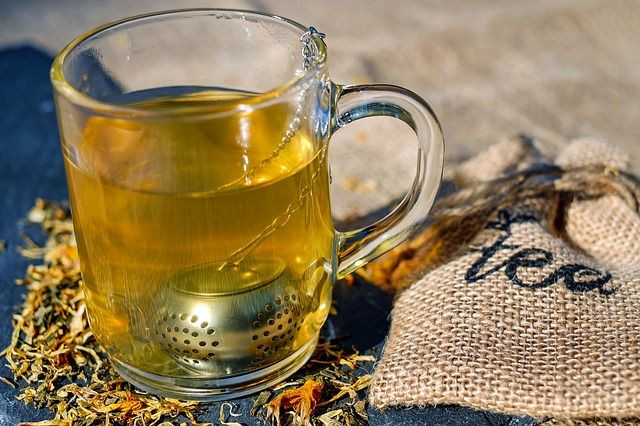4 Best Drinks To Fight Dementia: Drinking Tea Daily Reduces Risk Of Cognitive Decline By 50 Percent In Old Age

Tea is a wildly diverse beverage that can be served hot or cold in a variety of flavors, year-round. The benefits of drinking tea go beyond its taste; its ingredients can combat a variety of ailments we experience, even in old age. Researchers from the National University of Singapore suggest drinking a cup of tea daily can improve brain health later in life, and even reduce the risk of dementia.
“The data from our study suggests that a simple and inexpensive lifestyle measure such as daily tea drinking can reduce a person’s risk of developing neurocognitive disorders in late life," said Lei Feng, assistant professor of psychological medicine at the National University of Singapore’s Yong Loo Lin School of Medicine, in a statement.
Read More: Eating Marmite For Dementia Prevention
The researchers found regularly drinking a cup or three of tea, whether green or black, potentially reduces the risk of cognitive decline by 50 percent, and as much as 86 percent in adults who carry the APOE e4 gene for developing Alzheimer's disease. The APOE gene influences an individual's risk for the more common late-onset type of Alzheimer's.
Everyone has two copies of the APOE gene, and its combination determines our APOE “genotype”, including E2/E2, E2/E3, E2/E4, E3/E3, E3/E4, or E4/E4. The APOE4 allele increases the risk of Alzheimer’s and lowers the age of onset. One copy of E4 (E3/E4) increases the risk by two or three times, while two copies (E4/E4) can increase the risk by 12 times. Drugs in development may alter the physical structure of the APOE4 protein so it acts more like a APOE2 protein, where even one copy appears to the reduce the risk of Alzheimer’s by up to 40 percent.
However, Feng and his colleagues have potentially found a simple, inexpensive, and natural treatment to reduce Alzheimer’s risk by about 90 percent in those genetically predisposed.
In the study, published in Journal of Nutrition, Health & Aging, tea-drinking habits were examined in a total of 957 healthy Chinese adults age 55 and older, from 2003 to 2005. Cognitive function was tested every two years until 2010. Data on lifestyle, medical conditions, and physical and social activity was also collected.
The findings revealed regular tea drinkers who drank at least one cup, and up to three or more cups a day, yielded the most brain health benefits. Both green tea and black/oolong tea were found to be protective, but they also need to be brewed from tea leaves, either loose or in tea bags. Fruit or herbal teas do not produce the same effects.
The long-term benefits of tea were attributed to the bioactive compounds in the leaves, including catechins, theaflavins, thearubigins and L-theanine. The flavonoids in the tea leaves have anti-inflammatory and antioxidant properties that prevent vascular damage in the brain.
Read More: Could Refined Sugar Lead To Dementia, Cognitive Decline?
"These compounds exhibit anti-inflammatory and antioxidant potential and other bioactive properties that may protect the brain from vascular damage and neurodegeneration," said Feng.
The researchers are planning to further explore the impact of the Asian diet on brain health in aging. This includes investigating the effects of bioactive compounds in tea and testing their biological markers. Moreover, they emphasize the findings of the study could also apply to other ethnic groups, not just Chinese adults.
"While the study was conducted on Chinese elderly, the results could apply to other races as well. Our findings have important implications for dementia prevention,” Feng said.
Currently, 47.5 million people have dementia and there are 7.7 million new cases every year. Alzheimer's disease is the most common cause of dementia, possibly contributing to 60 to 70 percent of cases. Although there is no cure or treatment for progressive dementia, like Alzheimer's disease, science has unveiled the best drinks to ward off the neurodegenerative disease.
Coffee
Similar to its rival tea, drinking coffee could reduce the likelihood of experiencing cognitive impairment. In a 2016 study, published in The Journals of Gerontology, researchers found women between 65 and 80 years old who drank more than 261 milligrams of caffeine each day, over 10 years, had a 36 percent reduced risk of dementia. Caffeine's protective effect may lie in its ability to bind to the brain's adenosine receptors. Their function becomes "aberrant with both normal aging and age-related pathology" according to the study.
Beer
Drinking beer could ward off dementia due to the presence of an antioxidant found in hops. A 2015 study in the Journal of Agriculture and Food Chemistry found the flavonoid xanthohumol (Xn) may delay, or even prevent the onset of dementia and other cognitive decline. The antioxidant, which is found in beer’s hops, has been proven to possess anti-cancer, anti-oxidation, and heart-protective properties, as well as the ability to prevent inflammation.
Champagne
A glass of bubbly could potentially improve brain health. A 2013 study published in Antioxidants and Redox Signaling found drinking three glasses of champagne every day can help to prevent the onset of dementia and Alzheimer's. The researchers looked at the possible effects of the phenolic acids — plant substances said to have antioxidant qualities — found in champagne on memory in rats.
Those given champagne were better at recalling how to find a treat than those given the alcohol-free drink. These rats found the treats five times out of eight, compared with four times out of eight in the rats given other drinks, including a non-champagne alcoholic drink, or an alcohol-free drink. Of course, it's best to take this with a grain of salt; since the study was done in rats, we can't assume the same effects will apply to humans.
Source: Feng L, Chong SM, Lim WS et al. Tea consumption reduces the incidence of neurocognitive disorders: Findings from the Singapore longitudinal aging study. Journal of Nutrition, Health & Aging. 2017.
See Also:



























